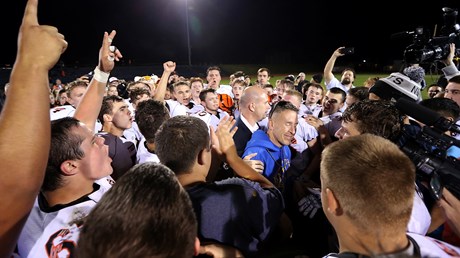Did kneeling at the 50-yard line violate the First Amendment? Or did a school’s attempt to stop it violate the First Amendment?

It is a fact that Joseph A. Kennedy, a former coach of the Bremerton Knights in the suburbs of Seattle, prayed on the 50-yard line after high school football games in the fall of 2015. But everything about those prayers is up for debate.
Were they public or private?
Was Kennedy praying just for himself, as an exercise of his faith, or as an official representative of the school district?
Did players join of their own accord, or were they pressured to participate?
Kennedy and the Washington state school district do not even agree on whether he was fired or failed to apply to extend his contract, or whether he ended his prayers with “amen.”
Those disagreements—big and small—are now going to the highest court in the land.
The US Supreme Court decided on Friday that it will consider the disputed facts and, more importantly, whether or not they add up to a violation of the First Amendment—and if so, by whom.
Kennedy’s attorneys argue that he was forced out of his coaching position in violation of his First Amendment–protected right to exercise his faith. The school district argues, on the other hand, that the coach’s prayers violated the same amendment’s prohibition against respecting an establishment of religion, since the coach was acting as a representative of the public school.
The court declined to hear the case in 2019. Justice Samuel Alito wrote at the time that “important unresolved factual questions would make it very difficult if not impossible” to consider the constitutional questions raised by the coach’s prayers.
He also argued, though, in a statement joined by justices Clarence Thomas, Neil Gorsuch, and Brett Kavanaugh, that the lower court’s ...
from Christianity Today Magazine
Umn ministry


.gif)

.gif)
.gif)
